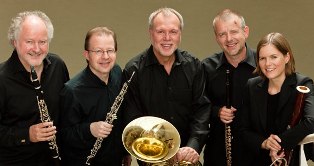
Berlin Philharmonic Wind Quintet a Treat for Chamber Music Cincinnati
Chamber Music Cincinnati may have peaked early.

At least, it will be hard to top the Berlin Philharmonic Wind Quintet, which opened CMC’s 2010-11 season Tuesday night (October 5) in Werner Recital Hall at the University of Cincinnati College-Conservatory of Music.
The stellar ensemble, founded in 1988 by members of the Berlin Philharmonic Orchestra, played before a full house, including many students and young people, giving a strong downbeat to the organization’s 81st season.
It was pure luxury to hear these players in Werner Hall – to hear a wind quintet in general, with its mixed sonorities and styles of performance -- as opposed to the string ensembles generally featured on classical chamber music concerts.
Flutist Michael Hasel, oboist Andreas Wittmann, clarinetist Walter Seyfarth, hornist Fergus McWilliam and bassoonist Marion Reinhard (all except Reinhard are original members of the Quintet) performed works by Mozart, Franz Ignaz Danzi, Paul Hindemith, Samuel Barber and Carl Nielsen. It was a select program that was over much too soon.
The concert began with a musical rarity, Mozart’s Fantasia for a Clockworkorgan in F Minor, KV 594. Composed in 1790 in response to a commission from an art gallery in Vienna, it is one of the composer’s last works.
[Note of explanation:
A “clockworkorgan” is a mechanical
instrument combining a clock with organ flute pipes struck by pins on a
rotating cylinder, in the manner of a music box. Mozart’s KV 594, the last work actually
entered in Mozart's personal catalog, was one of several he wrote for the device. It is a testament to Mozart’s genius and
musical integrity that, though he thought little of the clockworkorgan, he
wrote only his best music for it. Apparently, Turkish Sultan Murad III of the Ottoman Empire liked the one presented to him by English organ maker Thomas Dallam in 1598 on behalf of Queen Elizabeth I. The arrangement for wind quintet heard on this
program is by Berlin Quintet flutist Hasel.]

The Fantasia began with a somber Adagio, followed by a sprightly Allegro with a fanfare-like opening, then a reprise of the Adagio. The precision of the Quintet and their seamless ensemble were astonishing, as they remained throughout the evening.
German composer Danzi (1763-1826) was one of the fathers of the wind quintet, having left nine, including the E-flat Major Quintet (1822) heard on this program. A more charming work would be hard to imagine, with its classical shaping, refinement and engaging thematic material, all vividly conveyed by the Berlin Quintet. Hindemith’s Kleine Kammermusik, Op. 24, No. 2, was similarly appealing (not at all “difficult” per Hindemith's sometime reputation). The first movement, Lustig, mässig schnelle (“Merry, moderately fast”) was melodic, even folk-like, with galloping rhythms that wound down at the end. Hasel switched to piccolo in the second movement, Walzer, durchweg sehr leise (“Waltz, very gentle throughout”) while Ruhig und einfach (“Quiet and simple”) opened gently, with flute and clarinet in thirds. The latter movement was remarkable for the sound produced by hornist McWilliams, incredibly soft, as if coming from afar. The last two movements, both rapid, were “merry” indeed, bringing the first half of the concert to a bright, upbeat conclusion.
Barber worked with members of the New York Wind Quintet while composing his “Summer Music” (1956). As a result, it makes an ideal showcase for the wind quintet genre and its five very individual instruments. In six short sections (one barely half-a-minute long), it is a tone painting of summer, with titles like “slow and indolent,” “lively” and “joyous and flowing.” It began in a languid mood, with horn and bassoon in augmented fourths followed by a lovely solo by oboist Wittmann. The music grew more virtuosic as it progressed -- rapid staccato alternating with smooth lines, plus rippling and scurrying up and down the staff -- before returning from whence it came to end with a tiny rustle.
Final number on the program was Danish composer Nielsen’s masterful Quintet in E Major (1922), an absolute gem that delighted the Werner Hall crowd. Whether cheerful, even “chirping,” as in the first movement Allegro ben moderato, witty in the Menuet, solemn in the Praeludium introducing the Theme and Variations, or full of surprises in the Variations themselves, it made a splendid conclusion to the evening. (This listener could not help smiling during the first movement, whose main theme sounded like a cross between “Dixie” and “Simple Gifts.”)
Wittmann switched to English horn in the Praeludium, which also contained a mini-cadenza for Hasel on flute before the full ensemble gently sounded the Variations theme, a hymn tune written by Nielsen in 1916 (“Jesus Mine, Let My Heart Savor”). The 11 Variations highlighted the instruments in turn and were filled with character: skittering flute in no. 2, braying clarinet (Seyfarth) and grumbling bassoon (Reinhard) in no. 5, solo bassoon in no. 7, oboe and clarinet over a drone in no. 8. (Supposedly, the composer had his friends in mind when he wrote the Variations, much as Elgar did in his famous “Enigma” Variations, though no program is given.)
Responding to a warm, standing ovation, the Quintet performed two encores, which were introduced with great good humor by Scotsman/French hornist Fergus McWilliam. Both were a salute to America. The first, a sassy, jazzy suite on American tunes by Kazimierz Machala, quoted “Camptown Races, “Old Folks at Home,” “Yankee Doodle” and “When Johnny Comes Marching Home.” The second was a blues movement from a quintet by American composer/jazz advocate Gunther Schuller.
Chamber Music Cincinnati’s next concert features the Trio con Brio Copenhagen (violin, cello and piano) October 26 at 8 p.m. in Werner Hall. Tickets are $25, available by calling (859) 581-6877, or online at www.CincyChamber.org